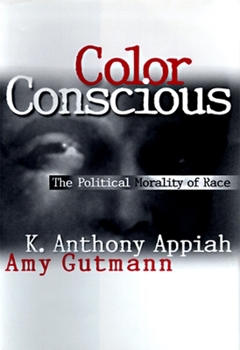Color Conscious: The Political Morality of Race
Select Format
Select Condition 
Book Overview
In America today, the problem of achieving racial justice--whether through "color-blind" policies or through affirmative action--provokes more noisy name-calling than fruitful deliberation. In Color Conscious , K. Anthony Appiah and Amy Gutmann, two eminent moral and political philosophers, seek to clear the ground for a discussion of the place of race in politics and in our moral lives. Provocative and insightful, their essays tackle different aspects of the question of racial justice; together they provide a compelling response to our nation's most vexing problem. Appiah begins by establishing the problematic nature of the idea of race. He draws on the scholarly consensus that "race" has no legitimate biological basis, exploring the history of its invention as a social category and showing how the concept has been used to explain differences among groups of people by mistakenly attributing various "essences" to them. Appiah argues that, while people of color may still need to gather together, in the face of racism, under the banner of race, they need also to balance carefully the calls of race against the many other dimensions of individual identity; and he suggests, finally, what this might mean for our political life. Gutmann examines alternative political responses to racial injustice. She argues that American politics cannot be fair to all citizens by being color blind because American society is not color blind. Fairness, not color blindness, is a fundamental principle of justice. Whether policies should be color-conscious, class conscious, or both in particular situations, depends on an open-minded assessment of their fairness. Exploring timely issues of university admissions, corporate hiring, and political representation, Gutmann develops a moral perspective that supports a commitment to constitutional democracy. Appiah and Gutmann write candidly and carefully, presenting many-faceted interpretations of a host of controversial issues. Rather than supplying simple answers to complex questions, they offer to citizens of every color principled starting points for the ongoing national discussions about race.
Format:Hardcover
Language:English
ISBN:0691026610
ISBN13:9780691026619
Release Date:September 1996
Publisher:Princeton University Press
Length:232 Pages
Weight:3.25 lbs.
Dimensions:0.8" x 6.0" x 9.0"
Customer Reviews
1 rating
"In order to get beyond racism..."
Published by Thriftbooks.com User , 25 years ago
This is a terrific book. In clear and persuasive terms, Appiah begins the book by explaining how "race" is a fiction, but "racism" is a fact. This seeming paradox presents the difficult challenge that Gutmann then addresses in the second half of the book. On one hand, she recognizes that social justice seems to require that we not define people in terms of their so-called "race." On the other hand, she also shows how social justice demands that we eradicate racism, especially insofar as it affects people's civic life. This leads to the central problem of the book: If we don't take account of people's race, how can we respond to the social injustices stemming from racism? Gutmann makes a powerful case why fairness demands that we be "color conscious," at least for some purposes and for the time-being. She also explains why class-consciousness cannot resolve the problems stemming from racism, nor can proportional representation based on race.These conclusions may raise the hackles of those who believe that our country should be color-blind, but the arguments that lead there are carefully constructed, logical, and in the end, largely persuasive. Moreover, they are chock-full of concrete examples that drive home the theoretical points. Whether she is talking about the attributes of a successful program in affirmative action at AT & T or data on S.A.T. scores analyzed by both race and class, Gutmann makes a powerful case from which even honest critics will have much to learn.Both Appiah's and Gutmann's arguments are nuanced, theoretically sophistocated, and informative. Moreover, they are a pleasure to read. Gutmann's essay, in particular, has an impressive style in that it uses concrete examples to illustrate her theoretical points, as well as solid theoretical arguments to illuminate thorny areas of public policy. Wilkins' introduction and Appiah's epilogue are also well-written and valuable. This book is important reading for all people interested in responding to racial injustice.





